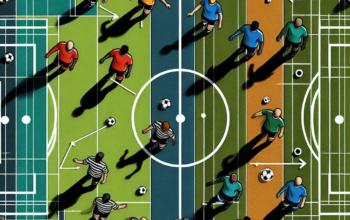The world of sports betting has evolved significantly, not just in terms of availability and technology but also in understanding the psychological facets that contribute to successful betting strategies. The intricate interplay of human emotions, cognitive biases, and behavioral patterns plays a critical role in how individuals engage with sports betting. To optimize betting performance, understanding the psychology behind decision-making is not just beneficial—it’s essential. In this article, we will explore the fundamental role of psychology in sports betting success, dissecting its impact on bettors’ behavior, decision-making processes, and overall outcomes.
The Psychology of Decision-Making in Sports Betting
Understanding the psychology behind decision-making is vital for anyone looking to succeed in sports betting. The cognitive processes that inform betting decisions are often influenced by emotions such as excitement, anxiety, and overconfidence. Bettors frequently rely on heuristics, mental shortcuts that simplify decision-making, leading to biases that can adversely affect their choices. For instance, a bettor’s recent experiences with a team or player may lead to hyperbolic discounting—a behavioral economics principle where individuals prioritize immediate gratification over long-term value. This can manifest as betting on favorite teams, regardless of their statistical performance, merely because of emotional attachment.
Additionally, the influence of social dynamics and peer pressure should not be overlooked. The thrill of sharing information and betting strategies among friends or online communities creates a bandwagon effect, where individuals may sway their betting choices based on group opinions rather than independent analysis. This herd mentality often leads to suboptimal betting strategies, blurring rational judgment with emotional responses. Therefore, understanding these psychological quirks is key for bettors to establish a more disciplined approach.
Emotional Control and Its Impact on Betting Performance
Another crucial psychological aspect of sports betting is emotional control. Effective betting requires a keen awareness of how emotions can cloud judgment. Many bettors fall into the trap of ‘chasing losses,’ a psychological phenomenon where individuals continue to bet in an effort to recoup their previous losses. This often leads to a spiraling effect where emotional decision-making supersedes rational analysis. Cultivating emotional intelligence, or the ability to understand and manage one’s emotions, becomes essential for maintaining discipline in betting.
Practices such as setting strict bankroll limits, taking breaks, and adhering to well-thought-out betting strategies can help bettors mitigate emotional interference. Creating a betting plan that separates logic from emotion can significantly enhance decision-making capabilities. Furthermore, mindfulness techniques, such as meditation or focused breathing, can aid bettors in calming their minds and improving concentration, ultimately leading to better betting outcomes.
Cognitive Biases and Their Effects on Betting Outcomes
Cognitive biases can heavily influence the way bettors perceive information and make decisions. Understanding these biases is crucial for creating effective betting strategies. Some common biases include confirmation bias, where bettors favor information that confirms their existing beliefs while overlooking contradictory evidence. For instance, if a bettor has a favorite team, they may only seek out data that supports their decision to bet on that team, disregarding their recent performance metrics or injuries.
Another common bias is the gambler’s fallacy—the misconception that past outcomes influence future events in independent probability scenarios. A bettor who believes that a losing streak must be followed by a winning streak may place irrational bets based on this flawed reasoning. By recognizing these biases, bettors can work to avoid them, adjusting their analysis and betting strategies accordingly. Developing a systematic approach that includes reviewing statistical data, the latest news, and expert insights can counterbalance these cognitive pitfalls.
Furthermore, the Dunning-Kruger effect—a psychological bias where individuals with low ability overestimate their competence—poses a significant risk for less experienced bettors. Many novices enter the world of sports betting with inflated confidence, leading to poor decision-making and ultimately greater losses. Gaining awareness of this bias is the first step toward developing a more informed and realistic approach to sports betting.
The Importance of Data and Evidence-Based Betting
In modern sports betting, data analysis and evidence-based decision-making are becoming increasingly critical. The ability to interpret statistics and trends can significantly enhance a bettor’s performance, moving from emotionally-driven decisions to informed conclusions drawn from concrete data. Psychological studies have shown that people often overlook statistical evidence in favor of anecdotal experiences. This highlights the importance of training oneself to analyze and interpret data credibly and objectively.
Bettors can benefit from employing various statistical models, betting systems, and analytics available today. By integrating these tools with their psychological understanding, bettors can create a feedback loop of learning and improvement. For example, utilizing sophisticated algorithms helps to identify patterns in team performance, player statistics, and historical outcomes, leading to more calculated betting decisions.
Moreover, the rise of sports betting platforms offers betters extensive resources to evaluate information accurately. Many platforms now provide predictive analytics and insights, allowing bettors to weigh their choices more effectively. This leads to more grounded motivations for placing a bet, distancing decisions from emotional influences.
The Future of Sports Betting Psychology
As technology and data analytics evolve, the field of sports betting psychology is set for significant advancements. The integration of virtual reality (VR) and artificial intelligence (AI) has begun to shape how bettors engage with their strategies. For instance, virtual simulations can create immersive environments to analyze decision-making under pressure, helping bettors practice emotional control and behavioral strategies in realistic settings. Such technologies can provide an unparalleled understanding of how psychological factors play out in high-stakes situations.
Additionally, ongoing research into the psychology of gambling continues to unfold, shedding light on how mental health patterns correlate with betting behavior. As the field progresses, it will likely yield innovative tools for monitoring emotional states and cognitive biases in real-time during the betting process, paving the way for more disciplined betting practices. Continuous learning about how psychological aspects influence betting will become an indispensable part of a successful bettor’s toolkit.
Furthermore, in the wake of increasing regulations and responsible gambling initiatives, bettors will be educated on the psychological aspects of betting. This education aims to cultivate a culture of responsible gambling while providing strategies that empower individuals to bet judiciously. By enhancing awareness about the role of psychology in sports betting, the community can drive a shift toward long-term success and sustainability in betting behavior.
In conclusion, understanding the role of psychology in sports betting success extends far beyond emotional control and decision-making. By recognizing cognitive biases, utilizing data-driven strategies, and adapting to the evolving landscape of betting practices, bettors can significantly enhance their opportunities for success. As we look to the future, the intertwining of psychology and technology will offer even greater insights into effective betting methods, ultimately leading to more informed bettors and responsible gambling practices.
FAQs
What is the most critical psychological factor in sports betting success?
The most critical psychological factor can vary, but emotional control plays a significant role. Bettors who can manage their emotions and avoid impulsive decisions generally see better outcomes.
How can cognitive biases affect sports betting decisions?
Cognitive biases can distort perception and lead to irrational betting choices. For example, confirmation bias can make bettors ignore important data, while the gambler’s fallacy may lead them to believe previous outcomes will influence future events.
Can mindfulness practices improve betting performance?
Yes, mindfulness practices can enhance focus and emotional regulation, enabling bettors to make more rational, less impulsive betting decisions.
How does data analysis play a role in effective betting strategies?
Data analysis helps bettors make informed decisions based on statistical evidence rather than emotions or biases, significantly improving their chances of success.
What does the future hold for sports betting psychology?
The future looks promising with advancements in technology like AI and VR, which will help bettors understand psychological factors better and develop more effective strategies for betting.






